|
World Jewish News

Construction work in Elazar, a settlement in the Gush Etzion bloc, in July 2010. Photo by: AP
|
Israel official: Netanyahu to offer Palestinians partial settlement freeze
13.09.2010, Israel Prime Minister Benjamin Netanyahu seeks to adopt a policy identical to that of his predecessor for construction in West Bank settlements - a partial freeze - as the September 30 end of the moratorium approaches.
Under Ehud Olmert, more than 90 percent of construction was carried out in the major settlement blocs - Ma'aleh Adumim, Gush Etzion and Ariel.
Netanyahu will be going to Sharm el-Sheikh in Egypt tomorrow for the second round of direct negotiations with the Palestinians, where he will be joined by Palestinian President Mahmoud Abbas, U.S. Secretary of State Hillary Clinton, U.S. Middle East envoy George Mitchell and Egyptian President Hosni Mubarak.
The Palestinians have said they will quit the talks if the settlement freeze does not continue, and a senior Palestinian source says this remains their firm position.
Before the 2007 summit meeting in Annapolis, Maryland, Olmert reached an understanding with the Bush administration that there would be a partial construction freeze in West Bank Jewish settlements. The understanding provided that Israel would not limit construction in Jewish neighborhoods of East Jerusalem, but would not build in Arab neighborhoods.
Netanyahu has already embraced that policy in Jerusalem following the crisis with the United States in March over construction in the Ramat Shlomo neighborhood.
Olmert had committed to George W. Bush that construction in isolated settlements outside the settlement blocs and east of the separation barrier would be permitted only in built-up areas, so no settlements would be expanded or new land settled. In that context, virtually no new construction was undertaken in isolated settlements other than public buildings and a small number of new houses.
Olmert also committed that in the large settlement blocs, construction would be permitted beyond built-up areas but only just beyond their perimeter. As a result, thousands of new housing units were put up in Ma'aleh Adumim, Beitar Ilit, Modi'in Ilit and Gush Etzion.
Olmert also committed that unauthorized outposts would not be expanded because they were due to be evacuated. Responsibility for supervising compliance with the understandings was given to Olmert's political adviser, Shalom Turgeman, and Defense Minister Ehud Barak.
According to a senior official in Jerusalem involved in contacts with the U.S. administration, Netanyahu presented his plan to implement Olmert's policy to Mitchell, President Barack Obama and Secretary of State Clinton.
Netanyahu hinted at the approach yesterday at a meeting with Likud cabinet ministers and expanded on it in a meeting with Tony Blair, the representative of the Middle East Quartet comprised of the United States, European Union, United Nations and Russia. Nonetheless, Netanyahu did not tell Blair or the Americans that construction criteria would be based on distinguishing between settlements based on their geographic location.
At the Likud cabinet ministers' meeting, Silvan Shalom and Limor Livnat asked Netanyahu for clarifications about the future of the settlement freeze. The prime minister hinted that he was prepared to adopt a formula involving a partial freeze after the expiry on September 30.
"At the end of the month, the freeze order is due to expire and we have to think about what is the wise thing to do," Netanyahu said, adding that the potential exists to build 19,000 housing units. "But I believe that in practice what will be built will be much less. We will not agree to be dictated to that nothing will be built, but between 0 and 1 there are other possibilities."
At his meeting with Blair, Netanyahu said Israel cannot continue with an absolute settlement freeze, explaining that Israel would not build tens of thousands of housing units that are in the planning stages, but would not suspend the lives of Jewish residents of the West Bank.
Netanyahu also said he did not accept the Palestinian approach that if there is no complete freeze, they would leave the talks. The international community views the settlement freeze issue as a test of Israel's seriousness, Netanyahu said, but added that Israel also had tests for the seriousness of the Palestinians, such as recognizing Israel as a Jewish state.
Several hours earlier, the Israeli prime minister told the cabinet that Palestinian recognition of Israel as the nation-state of the Jewish people would be critical to reaching a peace agreement.
"We are saying that the solution is two states for two peoples," Netanyahu said. "To my regret, I am still not hearing the phrase 'two states for two peoples' from the Palestinians. I am hearing them say 'two states,' but I am not hearing them recognize two states for two peoples."
By Avi Issacharoff and Barak Ravid
Haaretz.com
|
|
